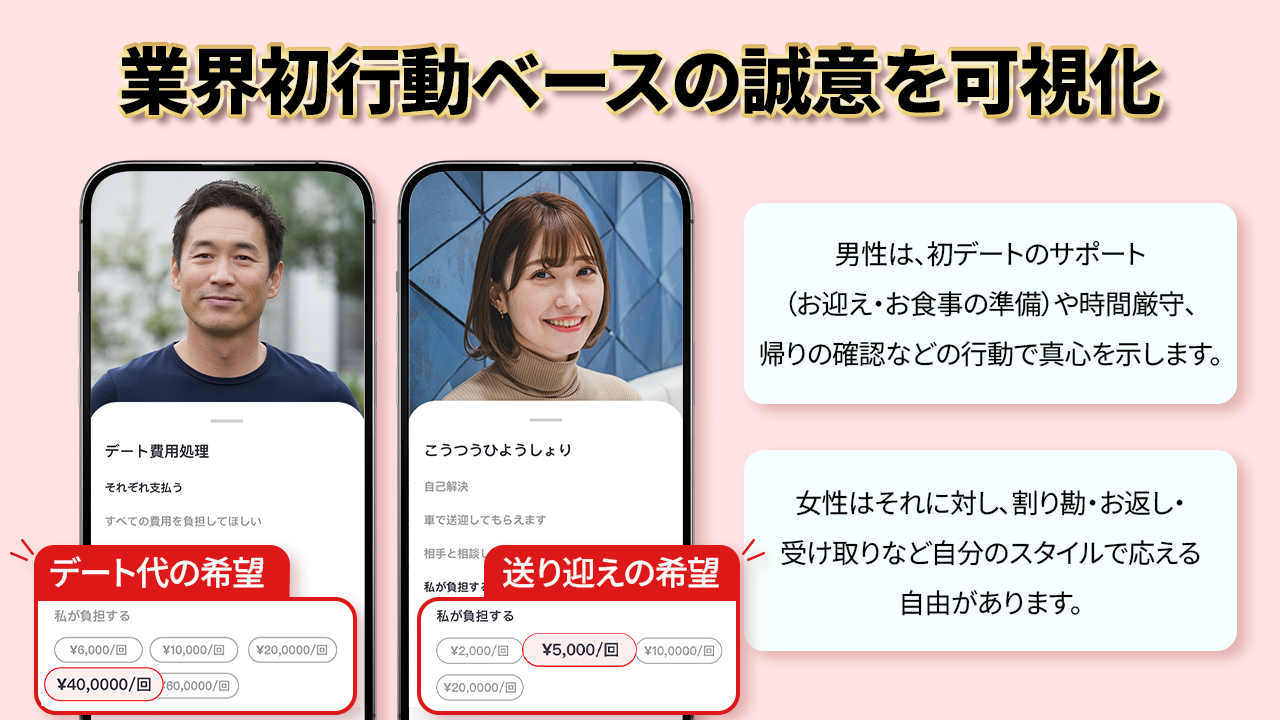「あの人の優しさは、ただの親切?それとも、特別な想いの表れ?メッセージの一行一句、仕草の一つひとつに、一喜一憂してしまう…」。そんな不安定な気持ちで過ごす日々は、本当のパートナーを見つけるための貴重な時間を消耗してしまいます。私たちは皆、確かなつながりを求めながらも、しばしば不確かな「サイン」に依存し、自分の感情を翻弄されがちです。
世の中には多くの「告白される前兆」に関する情報がありますが、その多くはスピリチュアルなサインや一方的な期待に頼ったものが少なくありません。「メッセージの既読が速い」「SNSのストーリーにすぐいいねがつく」といった表面的な行動だけを追いかけることは、かえって現実を見誤り、互いの本質を見つめる機会を逃してしまう可能性さえあります。あなたが求めているのは、そんな運任せのゲームではなく、信頼に満ちた確かな関係のはずです。
この記事では、Yoitokiの「プロフェッショナルに導かれた、心の平等な恋愛」という哲学に基づき、単なる「サイン探し」を超えて、相互理解と明確な意図から関係が自然に進展していくための、健全で現実的な観察ポイントをお伝えします。あなたの真剣な思いに、プロフェッショナルな視点から寄り添います。
目次
- 「前兆」探しの落とし穴。Yoitokiが重視する「相互に見える化された関係性」とは
- 信頼できる「告白前のサイン」— それは「敬意」と「持続性」から読み解く
- 前兆を感じたあなたができる、建設的な3つの心構え
- よくあるご質問 (FAQ)
- 結論
- 新しい形の出会い、始めませんか?
「前兆」探しの落とし穴。Yoitokiが重視する「相互に見える化された関係性」とは
恋愛の初期段階で誰もが経験する「サイン探し」。この行為そのものは、好きという気持ちの自然な表れですが、ここに落とし穴があります。一方的なサイン探しは、対等なパートナーシップへの第一歩ではなく、むしろ不安定な関係性の始まりになりかねないのです。
一方的なサイン探しが、誤解とすれ違いを生む理由
心理学では「確証バイアス」と呼ばれる現象があります。これは、自分がすでに信じたいことを肯定する情報ばかりを無意識に集め、反証する事実は見落としがちになる傾向です。「好きかも」と思い始めると、相手の何気ない親切や社交的な振る舞いまでもが「特別な好意の証」として過大解釈されてしまいます。例えば、仕事で連絡が多くなっただけなのに「自分に興味があるからだ」と解釈したり、誰にでもしている気遣いを「自分だけへの特別な気遣い」と感じたりするのです。このような断片的な行動の解釈は、現実ではなく、私たちの内面の希望や不安が投影された「幻想」に過ぎないことがほとんどです。Yoitokiが提唱する感情的な平等は、このような一方的な解釈や期待の非対称性からくる不安定さを脱却するための第一歩です。
「相互努力」のサインが、本当の「前兆」である理由
では、健全な関係の「前兆」とは何でしょうか。Yoitokiが重視するのは、相手が一方的にアプローチするのを待つことではなく、お互いが少しずつ心を開き、距離を詰めようとする「双方向の変化」、つまり相互努力です。これは、メッセージの応答速度のような些細なことではなく、より実質的な行動に現れます。
- あなたから誘ったランチに快く応じてくれた後、今度は相手から別の企画を提案してくる。
- あなたが共有した趣味の話を覚えていて、関連する面白い記事のリンクを送ってくれる。
- お互いの価値観についての会話で、相手も同じように自分の考えをオープンに語ってくれる。
これらの行動は、相手が単に「反応」しているだけではなく、関係を能動的に「構築」しようとする意思を示しています。この双方向のエネルギー交換こそが、持続可能な関係の最も信頼できる礎なのです。
健全な関係の基盤は、「直感」ではなく「積み重ね」
一目惚れや強烈な直感は確かにロマンチックですが、それだけで長期的な関係が築けるとは限りません。Yoitokiの考える健全な関係の基盤は、繰り返し会う中で育まれる信頼と安心感の「積み重ね」 にあります。一度のデートでの「感動」よりも、三度、四度と会ううちに「この人となら普通の日常も楽しい」と思えることの方が、はるかに重要です。この「積み重ね」のプロセスを通じて、相手の本質的な人柄—例えば、ストレスへの耐性、他者への思いやり、約束を守る誠実さ—が見えてきます。Yoitokiの「Kokoromusubi AI」が着目するのも、まさにこのような深い互換性を構成する要素です。表面的なサインではなく、時間をかけて確認される本質的な資質に目を向けることが、本当の意味で「告白される前兆」を見極める力につながるのです。
信頼できる「告白前のサイン」— それは「敬意」と「持続性」から読み解く
それでは、一方的な幻想ではなく、信頼に足る「告白される前兆」とは具体的にどのようなものなのでしょうか。鍵となるのは、明確な意図と品質重視の視点です。単なる「脈あり」行動のチェックリストではなく、「この人と真剣に関係を築く意思」が感じられる、成熟した行動に注目しましょう。
【行動サイン1】継続的で尊重されるコミュニケーション
あなたとの関係に真剣な意図を持つ人は、コミュニケーションに「持続性」と「尊重」を示します。これは、深夜の寂しさからくる衝動的な連絡や、内容のない「元気?」の一言ではありません。あなたの生活リズムや仕事の時間帯を考慮し、返信を急かすことなく、そして何より「内容のある対話」を継続しようとします。例えば、「今日は忙しい一日だったみたいだね。無理せゆっくり休んで」という気遣いや、前回の会話で話題になったあなたの仕事のプレゼンについて「あのプレゼン、うまくいった?」とフォローアップのメッセージが来るようなら、それはあなたという「個人」に関心を持ち、その物事を覚えていようとする誠実な態度の表れです。これはYoitokiが目指す、お互いを尊重し合う情緒的な平等のあるコミュニケーションの理想形です。
【行動サイン2】あなたの「個」を認め、理解しようとする姿勢
好意と親切の線引きが難しいと感じる方も多いですが、最も明確な違いはここに現れます。真剣な関心は、「あなたが何者であるか」という核心に向けられます。あなたの価値観、キャリアへの情熱、大切にしている家族観、没頭している趣味…。こういったものに対して、相手が深く興味を示し、質問をし、そして自分の考えも交えながら建設的な会話をしようとするなら、それは強力なサインです。単に「すごいね」と褒めるだけでなく、「なぜそれがそんなに面白いと思うの?」「それに興味を持ったきっかけは?」など、あなたの内面にある「動機」や「情熱」にまで踏み込んだ理解を示そうとします。この「個の尊重」は、Yoitokiのコミュニティが重視する質の高さと安全性の根幹をなす理念です。お互いを一個人として尊重するからこそ、軽々しい気持ちではなく、明確な意図を持って関係を築き上げていく土台ができるのです。
【行動サイン3】小さな約束を誠実に守るという「信頼の積み重ね」
「好きです」という一大宣言の前に、もっと大切なことがあります。それは、日々の「小さな約束を誠実に守る」という行動です。「今度、あの映画一緒に見に行こうね」と言ったら、実際にその映画が公開される頃に再度誘ってくれる。「この資料面白いから送るね」と言ったら、きちんと送ってくれる。こうした小さな信用の積み重ねが、相手に対する大きな信頼感を構築します。それは、相手が「口だけの人」ではなく、誠実で約束を重んじる人である証左です。大きな告白の言葉は、このような小さな信頼の積み重ねの上にはじめて、重みと真実味を持つのです。Yoitokiのプラットフォームでは、初回デートでの男性の交通費や飲食費の負担といった気遣いも、この「誠実さ」と「尊重」の一環として捉えています。それは義務ではなく、相手へのリスペクトと、この出会いを真剣に考えているという明確な意図の表現なのです。
💡 Yoitoki ヨイトキ インサイト:アルゴリズムを超えて
あなたが直面している課題こそ、私たちが「心結び(Kokoromusubi)」を開発した理由です。 他のアプリが表面的な特徴でマッチングするのに対し、私たちのAIは、ストレスへの向き合い方、思いやりの示し方、価値観の共有といった“深い相性”を見抜きます。
前兆を感じたあなたができる、建設的な3つの心構え
信頼できるサインを感じ始めたら、そのチャンスを最大限に活かすのはあなた自身の姿勢です。相手の気持ちを詮索する受動的な「観察者」から、関係を共に築く能動的な「参加者」へとシフトする時です。ここでは、Yoitokiのプロフェッショナルなガイダンスの精神に基づいた、建設的な心構えをご紹介します。
1. 観察者から「参加者」へ:相互理解を深める会話のススメ
「好きですか?」と直接聞くのは、相手にプレッシャーを与え、関係をぎこちないものにしてしまう可能性があります。代わりに、あなたも自分自身を開示しながら、相互理解を深める「開かれた質問」を心がけましょう。例えば、「(相手の意見に対して)私もまったく同感です。なぜそう思うようになったんですか?」と質問する。または、自分の価値観をオープンに共有し、「あなたはどう思いますか?」と尋ねる。このような会話は、単なる情報交換のではなく、お互いの内面世界を探検する「共探検」です。これにより、二人の間の相互努力が促進され、単なる「好き・嫌い」を超えた、深い精神的なつながりが育まれていきます。
2. 自分自身の意図を明確にする:「なぜこの人と関係を深めたいのか」
相手の気持ちを探る前に、一番最初にやるべきことは自分自身への内省です。「なぜこの人に惹かれるのか?」「この人とどのような関係を築きたいと本当に思っているのか?」自分自身の本心と向き合い、意図を明確にすることは、すべての行動の基盤となります。この自己理解ができていると、自然と態度や会話がブレなくなり、相手にも偽りのない誠実な姿が伝わります。これは、Yoitokiが掲げる明確な意図を持った恋愛の実践そのものです。自分自身の求めているものがわかっている人は、たとえ眼前の関係がうまくいかなくても、次の一歩を焦らずに踏み出せる強さを持っています。
3. 自然な流れを信頼する:プレッシャーは健全な関係の敵
カウンセリングの現場でも明らかなように、プレッシャーや急かしは、まだ脆弱な関係の芽を簡単に摘み取ってしまいます。相手を詮索したり、返事を急かしたり、次のステップを要求したりすることは、相手のペースや事情を尊重していない行為です。本当に意味のある関係は、強制されてできるものではなく、二人の心地よさと信頼が十分に育ったその先に、自然と生まれてくるものです。「この間(ま)」こそが、お互いが本当に合うかどうかを試す貴重な時間です。焦らずに自然な会話と共通の体験を積み重ね、信頼の土台を固めていく過程を大切にしてください。Yoitokiが提供するのは、この「自然な流れ」を無理なく促進できる、品質と安全性が担保された出会いの場です。
よくあるご質問 (FAQ)
Q: いくつかのサインが当てはまっていますが、こちらからアプローチすべきですか?
A: Yoitokiの考え方は、「アプローチ」よりも「理解を深める機会を作ること」です。サインを確認するために質問攻めにするのではなく、ご自身の気持ちをオープンにし、相手の反応を見守る姿勢が、相互尊重につながります。例えば、ご自身の好きな気持ちを伝えるのではなく、「お話するたびに、もっとあなたのことを知りたいと思わせてくれます」など、前向きな感想を伝えることから始めてみるのはいかがでしょうか。
Q: スピリチュアルなサインだけが強いのですが、どう解釈すれば?
A: 直感や高揚感は、ご自身がその方に強い関心を持っている証です。しかし、Yoitokiでは、それを現実での相互行動を通して確かめることを大切にしています。ご自身の感覚を大切にしつつ、現実の歩み寄りや誠実な行動にも目を向けて、バランスよく判断されることをお勧めします。
Q: 友達のまま停滞しています。関係を進展させるには?
A: これは多くの方が感じる悩みです。Yoitokiの「Kokoromusubi AI」は、趣味や価値観といった深い互換性に基づいてご紹介をするため、出会いの段階から「恋人候補」としての明確な意図を持って交流を始めていただけます。表面的なチャットでは見えない本質的なつながりに焦点を当てることが、友人ゾーンを防ぐ第一歩です。
Q: 親切と好意の線引きが難しいです。
A: もっともな疑問です。キーワードは「持続性」と「特別感」です。誰にでも同じような親切をする方なのか、それともあなたに対して特に気遣いや興味を示しているのか。Yoitokiが重視するのは、あなたという個人を唯一無二の存在として認め、尊重する態度です。それが感じられれば、それは単なる親切を超えた好意の可能性が高いでしょう。
Q: サインを感じても、すぐに告白がなくて不安です。
A: 相手も同じように真剣であればあるほど、慎重になるものです。この「間」こそが、お互いが本当に合うかを試す貴重な時間。焦らずに自然な会話と共通の体験を積み重ね、信頼の土台を固めていく過程を、Yoitokiは大切にサポートしています。良いものは時間をかけて熟成されるものだと思って、焦らずに見守ってみてください。
結論
本当の「告白される前兆」とは、奇跡的なサインでも、スピリチュアルな暗示でもありません。それは、二人の間で少しずつ育まれていく、「もっとあなたを知りたい」「あなたと未来を考えたい」という相互の敬意と誠実な態度の積み重ねです。一喜一憂するサイン探しから卒業し、相手の行動を注意深く観察し、そして何より、ご自身も能動的に関係に参加する。その先にこそ、確かなパートナーシップへの道は開けます。
このようなプロセスを経て築かれる関係は、ただ「付き合う」という状態を超え、人生のパートナーとして互いを高め合える、深く持続可能な絆につながっていきます。
もしも、サイン探しに振り回される恋愛ではなく、初めからお互いの価値観を理解し、尊重し合える相手と出会いたいとお考えなら。Yoitokiの「心結び」AIが、あなたの真剣な恋愛を、プロフェッショナルに、そして温かくサポートします。私たちのアプローチの違いを、ぜひホームページでご覧ください。
新しい形の出会い、始めませんか?
曖昧な関係に疲れてしまったあなたへ。 お互いの努力と本当の理解の上に築かれたつながりを求めるなら、あなたの居場所がここにあります。






